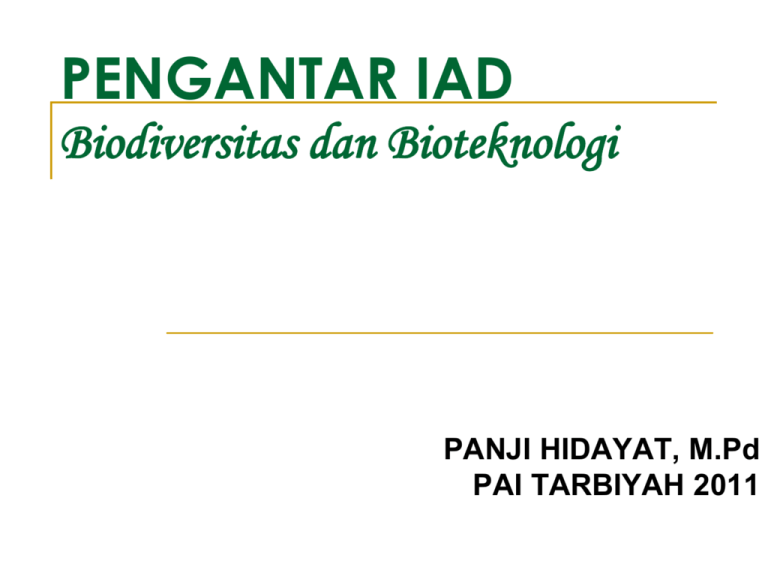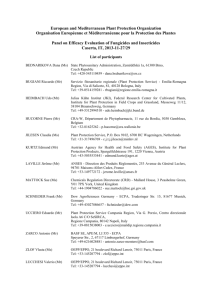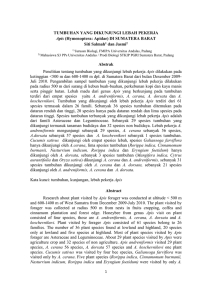PAI 5 - vionardi
advertisement

PENGANTAR IAD Biodiversitas dan Bioteknologi PANJI HIDAYAT, M.Pd PAI TARBIYAH 2011 Surat Al An’am Ayat 95 “ Sungguh, Allah menumbuhkan butir PadiPadian dan biji kurma” ) SURAT AN NAHL AYAT 11 Ï Dia menumbuhkan bagi kamu dengan air hujan itu tanam-tanaman; zaitun, korma, anggur dan segala macam buah-buahan. Sesungguhnya pada yang demikian itu benar-benar ada tanda (kekuasaan Allah) bagi kaum yang memikirkan. Pengertian Biodiversitas Keanekaragaman di antara makhluk hidup dari semua sumber, termasuk dari daratan, lautan, dan ekosistem akuatik lain, serta komplekskompleks ekologi yang mereka menjadi bagiannya; mencakup keanekaragaman di dalam spesies (genetik), di antara spesies dan pada ekosistem. Totalitas komponen dan sistem kehidupan organisme di bumi (biosfer)) Budaya? Biodiversitas genetik Frekuensi dan keragaman gen di dalam dan di antara populasi spesies yang sama. Biodiversitas genetik tampak pada perbedaan tinggi tanaman padi, rasa dari berbagai varietas shorgum, padi, jagung; variasi golongan darah manusia; dll. Dinyatakan dengan: Varietas, strain, ras dsb. Keanekaragaman gen Biodiversitas spesies Nepenthes spp. Biodiversitas Spesies Gabungan jumlah spesies (kekayaan; richness) dan jumlah individu di dalam spesies (kemelimpahan; abundance). Spesies adalah kelompok organisme yang dapat melakukan fertilisasi secara bebas, memiliki kesamaan ukuran dan struktur, dinamika populasi dan siklus reproduksi, pola perilaku, dan taksonomi. Keanekaragaman Anggrek Jawa Keanekaragaman spesies Biodiversitas ekosistem Variasi di dalam dan di antara ekosistem yang berbeda. Ekosistem adalah kompleks dinamis dari komunitas tumbuhan, hewan dan mikroorganisme dan lingkungan non-hayatinya, berinteraksi sebagai sebuah unit fungsional Keanekaragaman ekosistem Biodiversitas budaya Manfaat Biodiversitas • Konsumtif: 1. 2. 3. 4. 5. 6. Pangan Obat-obatan Sandang Papan Energi dll 1. 2. 3. 4. Ekologi Sosbudhankam IPTEKS dll • Non-konsumtif: Degradasi Biodiversitas " Salah satu proses yang terus berlanjut serta memerlukan waktu pemulihan selama jutaan tahun adalah hilangnya keanekaragaman genetik dan spesies karena rusaknya habitat alam. Inilah kebodohan kita yang sulit dimaafkan oleh anak cucu kita" (E.O. Wilson, Harvard University, USA). Aktivitas perusakan lingkungan (degradasi biodiversitas) Kebakaran Pembalakan Pertanian Perburuan Hilangnya biodiversitas. Bermacam sebab, yg paling fundamental dan irreversibel: extinction of species (kepunahan spesies). Penyebab hilangnya diversitas biologi terutama oleh manusia: Langsung: perburuan, koleksi, dan persekusi. Tidak langsung: perusakan dan modifikasi habitat Dari segi total hilangnya biodiversitas, efek tdk langsung jauh lebih penting dibanding pengaruh langsung. Mekanisme hilangnya Biodiversitas 1.Hilangnya/fragmentasi habitat 2.Introduced spesies (spesies pendatang) 3.Pencemaran pada air, tanah dan atmosfir. 4.Perubahan iklim global 5.Eksploitasi jenis hewan/ tanaman yg berlebih/overeksploitasi 6.Industrialisasi pertanian dan kehutanan Pengaruh perkembangan budaya: zaman purba (nomaden) zaman bercocok tanam zaman tumbuhnya permukiman (perkotaan) zaman tumbuhnya industri (mulai diterapkannya paham kapitalisme budidaya monokultur & monopoli) aman informasi/globalisasi ? What next ? Apa yang harus kita lakukan untuk Biodiversitas: Konservasi: 1. In-situ 2. Ex-situ 1. Fungsionalisasi Bioprospecting 2. Bioteknologi Bioteknologi General Definition Penerapan teknologi untuk memperbaiki organisme/jasad hidup Detailed Definition Penerapan teknologi untuk memodifikasi fungsi biologis dari organisme dengan menambahkan gen/sel/koloni sel dari organisme lain Peran/manfaat Bioteknologi Biotechnology is a series of enabling technologies, which involves the manipulation of living organisms or their sub-cellular components to develop useful Products (e.g. insulin) Processes (e.g. improved fermentation) Services (e.g. bioremediation) Biotechnology encompasses a wide range of fields, including the life sciences, chemistry, agriculture, environmental science, medicine, veterinary medicine, engineering and computer science. Biotechnology Application: Crop Production Animal Production Food & Nutrition Crop Yield Livestock Performance Organoleptics Output: grain and biomass Feed to gain improvements: - Photosynthesis, enzymatic regulation, plant structure, flowering, ripening, sprouting – Grain quality – Composition specifications and grade Selective breeding – Reducing the time it takes to develop improved crops Abiotic stress tolerance: – Increase the ability of crops to grow in a geography by increasing tolerance to: – Moisture and Drought - Heat and Cold - Saline - Heavy Metals Al, Se, Mn and Ozone Feed digestibility – – – – Pest Management Disease resistance - Fungus: verticillium, fusarium, sclerotinia, grey mould, botryrtis, powdery mildew, black sigatoka Bacteria: bacterial blight Virus: BYDV, mosaics, leaf curl, spotted wilt, ring spot, feathery mottle, necrotic yellow vein viruses High density, more completely balanced feed resulting in more meat per ton of feed – Protein quantity and quality – Oil (caloric energy) – Amino acids – Fatty acids – Starch – Carbohydrate – Vitamin and mineral composition – Antioxidants – Improved performance of growth factors and hormones to increase food yield Derive greater nutritional value from feed Ruminant animals (corn silage lignin) Increase oligosaccharides to reduce non -digestable compounds is soybeans (stachyose , galactose, raffinose) Reducing phytate content for increased bioavailability of amino acids, chelation of mineral ions for less P & N waste – – – – Meat composition: efficient delivery of micro / macro nutrients in human diet Meat texture, appearance, taste Protein, Oil and Amino Acids Vitamin and mineral composition Antioxidants - Foliar, Root, Fruit, Grain Sucking, Chewing, Piercing Herbicide tolerance - More environmentally benign e.g. Glyphosate, Alternate mode of action e.g. IMI, SU, Glufosinate Animal Health Animal fertility and genetics – - – Environment Carbohydrates / Starch – – – Substitute chemicals for gene traits Improve production practices – Reduced soil erosion, Improved ground and surface water, Less fuel, Less land Reduce fertilizer dependence - Improved plant extraction, transport and utilization decreases demand for synthetic fertilizers (Nitrogen, Phosphorus, Potash) Increase plant biodiversity - Expand crop gene pool and reduce risk of crop failures. 80,000 species of edible plants, cultivate 300, 12 are food staples. Aquaculture Sustainable production – – – – – – Salomon Talapia Trout Flounder Catfish Shrimp Resistant starch – slowly digested to improve colonic health, generation of short chain FA, slow energy release for diabetics and athletes Increased starch potatoes (reduce oil absorption during processing Fructan producing sugar beets (sweetness equal to sucrose without the calories) Probiotics Gastro intestinal health: colonic microflora Lactobacillus and Bifidobacterium stimulate mucosal immune system, increase resistance to food borne illness & chronic disease Phytochemicals – - Decrease pesticides Nutritional quality, cooking stability, shelf life - Low saturated fats - High oleic acid - Increased stearate - Increased laurate – Essential fatty acids (PUFA balance) – Disease prevention (cardiovascular, cancer, diabetes, obesity, osteoporosis, arthritis) Bioactive peptides Isoflavones Phytosterols Anti-oxidants: flavanol, lycopene, tocopherol Shelf life – – - Controlled plant ripening and post harvest shelf life Enhanced package goods shelf life eg Bread Reduce browning from bruising, polypheno oxidase Allergens and Safety – – – Reduced allergens: Glycoalkaloids, trypsin inhibitors, cyanogenic glycosides, proteins Reduced Mycotoxin: Fumonisin, Aflatoxin Detection methods for pathogens, toxins Enzymes in food production with higher purity & specificity: chymosin, lactase, alpha-amylase, amyloglucosidase, aceto lactate ecarboxylase, xylanase, lipase, meniculllases , cyclomaltodextrin glycoslytransferase. – Conversion of plant or animal raw material substrates into foods (e.g. cheese, bread, beer). – Bacteriocin preservatives / peptide antimicrobials (e.g. Nisin ) Medicine Pharmaceutical Proteins Production of complex proteins – – Improved processing – – – Increased yield, quality, consistency Optimized cost Reduced food loss / waste Improved food ingredients – – – – – – – – Organic acids: Lactic, citric, gluconic, proprionic Amino acids: lysine, methionine, tocopherol Vitamins Gums Sucrose Non nutritive and semi -nutritive sweeteners Processed starch products e.g. maltodextrins, oligosaccharides, sugars, high fructose corn syrups for health Carbohydrates such as arabinogalactans and inulins for prebiotic improved colonic microflora. Pectin processing yield and cooking properties Bio-energy production – – – Ethanol Lubricants Liquid Wax Waste water treatment Bio-catalysts Detergent proteases Bio-polymers Specialty Chemicals Fibers – – – Modified lignin from pulp Silk Cotton Edible vaccines for the management of: - Dental caries - Gastroenteritis virus - Hepatitis B - Measles - Genital herpes - Rotavirus - Enterogenic Escherichia coli – Norwalk virsus – Pseudomonas, – Staphylococcus – non Hodgkin's B -cell lymphoma – Insulin-dependent diabetes mellitus (IDDM), an auto immune disease Drug Discovery and Screening Bio-active molecules – – Mode of action Novel chemistry Natural products – Industrial Processing Abundant, cost effective production of therapeutic proteins with improved safety and specificity. Eg Hirudin Efficient drug delivery vehicle Food Processing – Gastroenteritis virus Reduced infestations from infectious disease that are human health risks eg Salmonella Quantity, composition and quality Amino acids methionine, lysine, tryptophan Vegetable oils Bio-pesticides – Bio -availability and preservation of vitamins & minerals: Iron, Folic Acid, Vitamins A, C, E Protein Plant based animal vaccines – – Fiber content – Pathogen resistance Raw material conversion: (proteins, Micronutrients – Insect & Nematode resistance Improved taste, texture and appearance lipids, carbohydrates) Nutrition Carcass quality – Food Enzymes Sensory quality: – Bio-Processing Identification and synthesis of phytochemicals from plants with medicinal and cosmetic properties. Mengapa bioteknologi diperlukan/ Perlu dikembangkan ?: •Alam memiliki kekayaan variasi kehidupan (BIODIVERSITY) • Contohnya: lihat berbagai variasi kulit biji buncis berikut Akan tetapi tidak semua variasi yang tersedia di alam sesuai dengan kebutuhan manusia Maunya manusia ? •Pisang dengan vaksinnya •Padi dengan nutrisi lengkap > Dan lain-lain ?????? Bioteknologi klasik; Misal: penggunaan ragi untuk roti, tempe , peyem dll Bioteknologi modern; Misal: industri enzim/vaksin, tanaman transgenik dll Bagaimana prinsip-prinsip bioteknologi modern? DNA Protein Enzim DNA disisipkan Fungsi sel Faktor lingkungan +/- Substrat Gen Organel sel Enzim +/- Protein F E8 E1 S E2 A Metabolit E3 B C D E4 E6 E E5 G Organel sel E7 Produk (contoh: Penicillin) P Dibedakan 2 pendekatan teknik rekayasa genetik Manipulasi gen • Identifikasi gen dari spesies lain dengan fenotipe yang diinginkan • atau memodifikasi gen yang ada (membuat alel baru) Introduksi gen • Menyisipkan gen baru pada organisme melalui teknik transformasi • Organisme baru disebut Organisme transgenik The Golden Rice Story • Vitamin A deficiency is a major health problem • Causes blindness • Influences severity of diarrhea, measles • >100 million children suffer from the problem • For many countries, the infrastructure doesn’t exist to deliver vitamin pills • Improved vitamin A content in widely consumed crops an attractive alternative The Golden Rice Solution -Carotene Pathway Genes Added IPP Geranylgeranyl diphosphate Daffodil gene Phytoene synthase Phytoene Vitamin A Pathway is complete and functional Phytoene desaturase Single bacterial gene; performs both functions ξ-carotene desaturase Lycopene Daffodil gene Golden Rice Lycopene-beta-cyclase -carotene (vitamin A precursor) Plant Tissue Culture A Requirement for Transgenic Development Callus grows A plant part Is cultured Shoots develop Shoots are rooted; plant grows to maturity Overview of creating transgenic plants using Agrobacterium tumefaciens. Kontroversi Bioteknologi • Should we develop transgenics? • Should we release transgenics? • Are transgenics safe? • Are transgenics a threat to non-transgenic production systems? • Are transgenics a threat to natural eco-systems?

